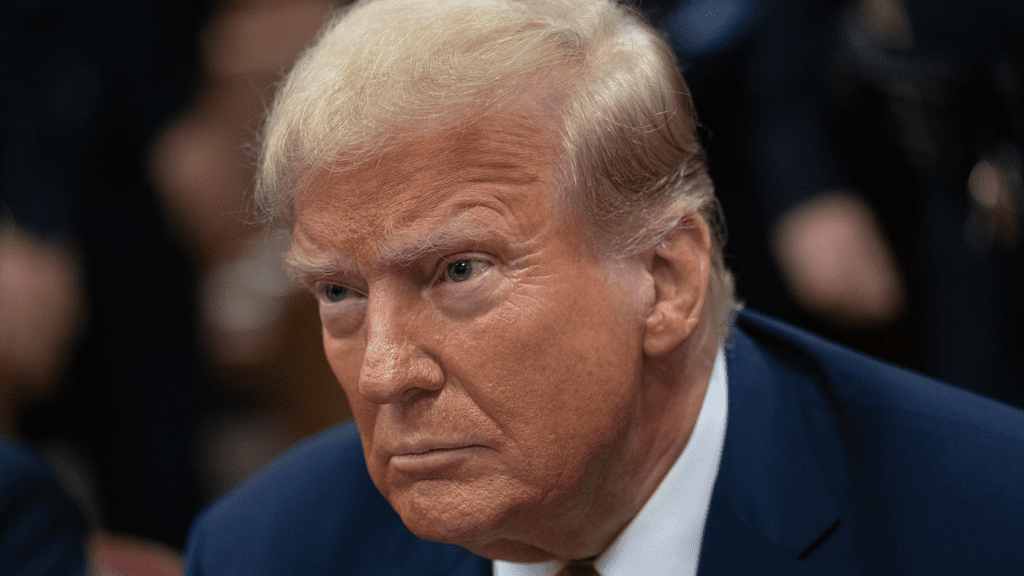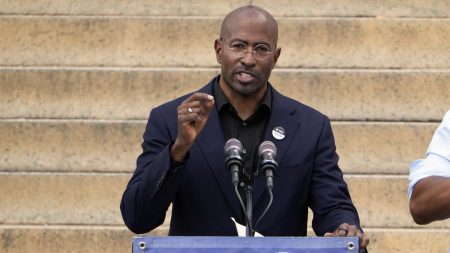Two of former President Trump’s legal cases clashed Thursday, as the Supreme Court held a hearing on his broad claims of immunity from criminal prosecution while his trial continued in New York over a hush money payment to adult film actress Stormy Daniels.
The Supreme Court case could stop Trump’s other three planned trials — for alleged offenses related to the Capitol riot of Jan. 6, 2021, the retention of sensitive information at his Florida resort of Mar-a-Lago, and attempts to overturn the 2020 election result in Georgia.
Special counsel Jack Smith, the prosecutor In the Jan. 6 and Mar-a-Lago cases, had urged the Supreme Court to quickly decide on the immunity issue, to no avail. Smith requested back in December for the court to determine the issue swiftly — when Trump’s trial was set for March.
Instead of speeding up the process, the justices allowed it to proceed at its normal pace — a benefit for Trump.
The proceedings in New York, where reporters in the court say he has sometimes seemed exasperated to have to sit through the re-airing of allegations of lurid personal conduct, are less advantageous to the former president.
Here are the main things to learn from the two proceedings
A good day for Trump at the Supreme Court
The Supreme Court hearing, the more important matter Thursday, generally went Trump’s way.
The only downside for Trump was that the justices seemed doubtful of the broadest argument made by his team — that a president or ex-president has nearly unlimited criminal immunity for any action committed in office.
However, several of the court’s six conservative justices seemed keen to differentiate between “official” acts and “private” acts — and seemed inclined to offer the president protection from prosecution for the former, at least.
They questioned the Department of Justice’s lawyer Michael Dreeben intensely about whether past presidents could, hypothetically, have been prosecuted for specific acts done while in office.
Justice Samuel Alito inquired whether former President Franklin D. Roosevelt could have been prosecuted for infringing the civil rights of Japanese Americans by interning them during World War II. “Today, yes,” Dreeben replied.
Justice Clarence Thomas posed a similar hypothetical regarding Operation Mongoose, a secret CIA-led effort in the early 1960s to depose the Cuban government led by Fidel Castro.
The overall tone of the conservative arguments drew implied criticisms from their liberal counterparts.
Justice Ketanji Brown Jackson asked Trump's representative, John Sauer, “Why is it that the president would not be required to follow the law when he is performing his official acts?”
Justice Sonia Sotomayor lamented that the principle that no one is above the law “in his official or private acts” has “been somewhat put into suspicion here.”
However, with conservatives making up a 6-3 majority, the likelihood favors Trump and his team.
Time — and delay — are Trump’s allies
There was another positive for Trump in the Supreme Court hearing.
The conservative justices seem willing to focus on the difference between private and official actions, which could delay the trial for Jan. 6-related charges.
Two of Trump's three appointed justices, Neil Gorsuch and Brett Kavanaugh, suggested that more hearings might be necessary to decide on the difference for the specific charges in the former president's indictment.
Trump aims to delay as many trials as possible until after the presidential election.
If Trump wins the presidency again, he could instruct the Department of Justice to dismiss any federal cases against him.
It's important to note that he doesn't have that power over state cases, like the New York hush money trial and the Georgia election probe.
However, Trump's legal team made some surprising claims
During questioning from Sotomayor, Trump's lawyer made some startling arguments.
The most remarkable claim was that a president could have criminal immunity for killing a rival.
Sotomayor posed a hypothetical where "the president decides that his rival is a corrupt person and he orders the military, or orders someone, to assassinate him." She then asked, "Is that within his official acts for which he can get immunity?"
"It would depend on the hypothetical," Sauer responded before adding that it "could well be an official act."
The suggestion sparked instant outrage on social media and received immediate criticism from some quarters.
"Understand what the Trump team is arguing here," Rep. Alexandria Ocasio-Cortez (D-N.Y.) wrote on social media. "Take it seriously and at face value. This is not a game."
In New York, there's a confrontation at Trump rallies
There are ongoing legal disputes in New York over whether Trump violated a gag order in social media posts attacking various adversaries.
Prosecutors argue that the former president violated the gag order 10 times, and they want the court to impose a $1,000 fine for each instance. Trump's team argues that he is simply responding to claims made by others.
Judge Juan Merchan has set another court date on the matter for Wednesday, which is typically a day off from trial proceedings in the case.
The complication is that Trump has rallies scheduled for that day in Wisconsin and Michigan.
This is the most direct example yet of how the legal cases are affecting Trump's efforts to win back the White House.
An unusual friendliness toward a damaging witness
The first week of actual trial proceedings in New York has been dominated by former magazine executive David Pecker.
Pecker has explained how the National Enquirer, the tabloid of which he was previously publisher, bought stories that could have damaged Trump with the intention of suppressing them.
There seems little doubt that Pecker's evidence has helped the prosecution more than the defense, so it was somewhat surprising to hear Pecker say he considers Trump a "mentor" and for the former president to return the warmth.
The quick-to-anger Trump called Pecker a "nice guy," leaving some observers confused.









